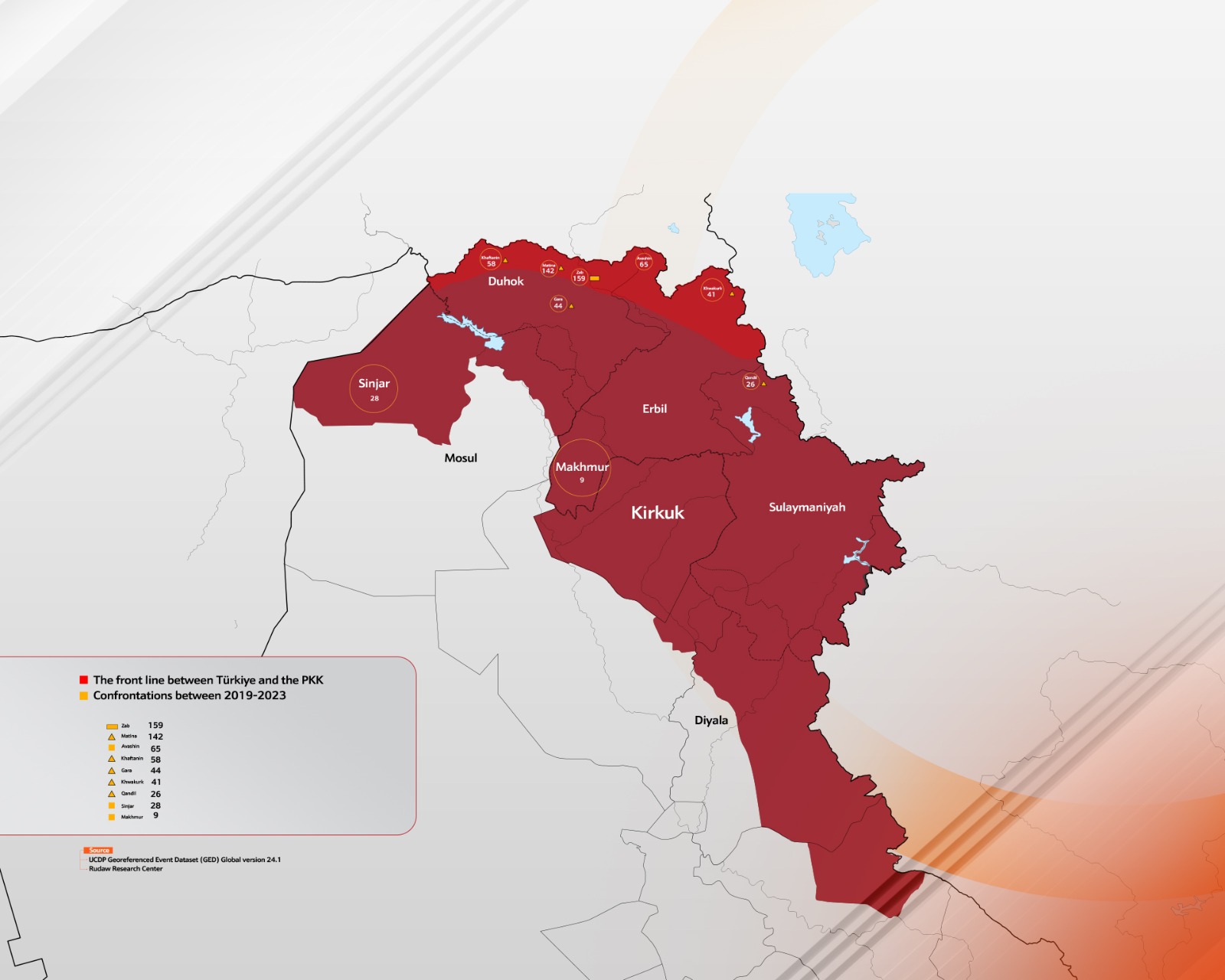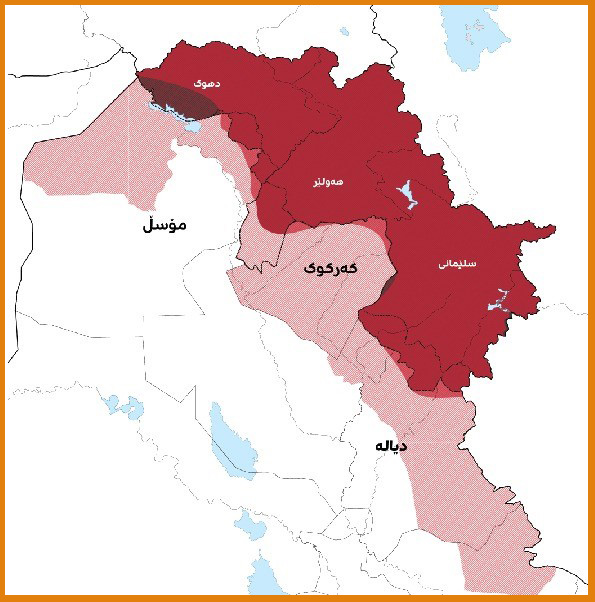Following Eid al-Adha, a new wave of military movements between Turkish forces and the PKK has erupted in Duhok province. The clashes are particularly intense in the northern district of Amedi, but there is a significant possibility of the conflict spreading to Mount Gara, located over 40 kilometers deep within the Kurdistan Region. This potential escalation marks a turning point, with implications for the region's political and military landscape. Given the current situation in the Middle East, this conflict is likely to persist longer than anticipated.
The Geopolitical Dimension of the Conflict
Recent clashes between Turkey and the PKK have strained relations between the Kurdistan Regional Government (KRG) and the PKK, creating a volatile situation. The Kurdistan Democratic Party claims that the PKK has brought the war deep into the Kurdistan Region, and the PKK accuses the KRG of collaborating with Turkey. However, the primary driver behind the current events may be rooted in broader geopolitical dynamics rather than internal tensions.
Turkey has demonstrated its willingness to act unilaterally, without seeking permission from Iraq or the Kurdistan Region, reminiscent of its actions in the 1990s. President Recep Tayyip Erdogan asserts that the world is experiencing a geopolitical upheaval, leading to continued political and military instability. Turkey is particularly concerned about the ongoing Russian-Ukrainian and Israeli-Hamas wars, which it believes pose threats to its national security.
Turkey's immediate concern is that the escalation of these wars could enhance the PKK's ability to obtain weapons and foreign aid. For instance, if Turkey's NATO membership results in increased support during an escalation of the Russian-Ukrainian conflict, the PKK might gain access to Russian weapons, such as surface-to-air missiles, or Ukrainian technology on the black market. Furthermore, Israel's criticism of Turkey's support for Hamas and its emphasis on Kurdish struggles heightens Ankara's fear that, in an escalated conflict, the PKK could receive direct or indirect assistance from Israel and its allies.
After attending NATO's 75th anniversary summit, Turkish President Recep Tayyip Erdogan stated that Turkey remains far from reaching a consensus with its allies on cooperation in the military industry and the fight against terrorism. Erdogan emphasized that Turkey's unique geographical position presents both opportunities and threats, positioning the country between the Eastern and Western blocs.
To navigate this complex landscape, Turkey has pursued a multifaceted foreign policy. Alongside its commitments to NATO, Turkey has strengthened its relations with China and Russia. It is also seeking membership in BRICS and aiming for a more significant role in the Shanghai Cooperation Organization.
Turkey believes that by enhancing political relations with regional countries—particularly Iraq and Iran—and normalizing relations with Syria, it can curtail the PKK's movements. This strategy includes the potential revival of the Adana Agreement, a 1998 accord between Turkey and Syria aimed at combating terrorism. But militarily, it wants to create a security zone south of its borders, which began in 2016 in Syria and in 2019 in the Kurdistan Region. Turkish officials look beyond the boundaries of the national pact adopted by the Majlis al-Mab'usan in the early 1920s, which includes the provinces of Idlib and Aleppo from Syria to the Kurdistan Region. Of course, Turkey's military presence from northern Syria to the Kurdistan Region will be more meaningful in this context.
Timing and Geography of Collisions
Turkey's Defense Minister has said that in terms of time, they want to end the Claw-Lock operations before the winter snow falls. He has set Mount Gara as the final target and says he will continue as long as the PKK remains. The PKK has said it is still in the area and fighting everywhere. Turkey aims to consolidate the geographical boundaries of its conflict with the PKK. Between 2019 and 2023, there were 1,154 incidents of organized violence, including military clashes between the PKK and Turkish forces, with about 64% occurring in the Kurdistan Region. This shift has distanced the fighting from Turkish territory.
Turkey seeks to establish a security line from Khawkurk in Erbil province to Haftanin in Duhok, altering the geography of the conflict. Turkey likely aims to strengthen the military bases it has established since 2019. Last year, the PKK attacked two Turkish army bases during winter, demonstrating that it may have found ways to evade drones and engage in clashes despite the snow and rain.
Consequently, Turkey is targeting the PKK's closest rear fronts in areas such as Metina, Haftanin, Avashin, and Basyan. The increased intensity of clashes along the northern part of the Amedi-Derelok line, which includes roads connecting Gara to the mountainous areas near the border, supports this strategy.
Until 2019, the border line starting in the Darkar district of Zakho and including areas such as Haftanin, Metina, Zap, Gali Balinda, Avashin, Basyan, Khawkurk, and Khnera in Erbil province held strategic importance for both Turkey and the PKK. Since May 2019, Turkey has launched six major operations (Operation Claw) and, unlike previous efforts, established more bases and headquarters in the mountainous areas to disrupt the PKK's transportation and logistics lines.
According to data from the Uppsala Conflict Data Program (UCDP), between 2019 and the end of 2023, there were 737 incidents between Turkey and the PKK in the Kurdistan Region, with 77.88% occurring along this border line. The remaining incidents took place along a second line of clashes, including Sinjar, Makhmur, Gara, Kandil, and the Sulaymaniyah region. For example, there were 159 clashes in Zap Valley, 142 in Mount Metina, 65 in Avashin, and 58 in Haftanin, but only 41 in Gara.
Gara, situated among the second mountain ranges in the Kurdistan Region, is crucial for the PKK's logistical preparations, training, and organization. Its significance has increased following the deployment of Turkish forces along the front lines of the border. For Turkey, capturing Gara is the final step in its strategy to keep the PKK away from the borders.
The Military Dimension
Turkish drones and air force have been effective against the PKK's traditional group movements. However, the PKK's use of caves and tunnel fighting has led Turkey to incorporate commando forces, primarily using helicopters, and to establish temporary military bases to control ground movements. Both Turkey and the PKK have adjusted their tactics in response to this evolving situation.
Turkey has increased its infantry presence, focused on controlling roads, and deployed anti-drone systems, such as the Korkut Air Defense System, in response to changes in PKK movements. The extent to which the PKK has developed or acquired drones and anti-drone systems remains unclear. However, some Turkish experts believe the PKK possesses anti-tank missiles (ATGMs), Russian SA-18 missiles, and kamikaze drones. Some media sources claim that the PKK is now using outdated drones compared to previous models. They also possess a ground-to-air kamikaze drone capable of targeting and shooting down enemy drones. Turkish President Recep Tayyip Erdoğan stated, "The weapons our allies provide us exist in the PKK's warehouses." Consequently, this shift means that the fighting will no longer rely solely on drones and air force; the role of infantry in the clashes on both sides will become more prominent, leading to an increased military presence.
Impact of conflicts on the Kurdistan Region and Iraq
In general, the border clashes, which have increasingly spread into the Kurdistan Region, have destabilized the situation in these border areas. Efforts by the Iraqi and Kurdistan Regional Governments to establish additional military checkpoints along the border, aimed at curtailing PKK movements and preventing Turkish military presence, have shown limited effectiveness in reducing the conflict. Instead, tensions between the PKK and the Kurdistan Regional Government, particularly the Kurdistan Democratic Party (KDP), have escalated significantly, bringing them closer to potential conflict than ever before.
The intensification of Turkey-PKK clashes within the Kurdistan Region first impacts Erbil and Baghdad. Erbil risks losing practical control over parts of its territory, while Baghdad faces heightened tensions as it attempts to maintain relations with Turkey while avoiding conflict with the PKK. This situation undermines Iraq's sovereignty and creates additional problems.
If Turkey advances to Gara, it will not be in the interests of Iran and its affiliated armed groups, as they view Turkey as a NATO member and Western ally. On the map, the expansion of influence zones between Turkey and Iran appears contradictory. Iran's influence in Iraq and Syria extends from the south and west towards the north and east, while Turkey moves in the opposite direction.
Iran's influence in Sulaymaniyah, the presence of Hashd al-Shaabi groups in conflict zones extending to Sinjar, the uncertain administrative situations in Diyala and Kirkuk provinces, tensions over local administration in Mosul, and the presence of armed groups in Syria all contribute significantly to Iran's regional power. Furthermore, the Kurdish Autonomous Administration's presence in Syria bolsters Iran's influence along Turkey's southern borders, though this is constrained by the PKK's presence from the Kandil-Haftanin line on the eastern-northern borders of the Kurdistan Region. As a result, Erbil has sought to normalize relations with Tehran and Baghdad more than ever before. Therefore, Turkey's incursion into a strategic location like Gara is likely to provoke protests from Iraqi armed groups.
The Iraqi side might not strongly oppose the blockade of mountain regions and the obstruction of roads from Mount Gara to areas such as Metina, Haftanin, Zap, Gali Balinda, Avashin, and Basyan. Historically, after conflicts in 1992 between the Kurdistan Front, Turkey, and the PKK, some forces relocated from Badinan to Zale in Sulaimani province. Thus, it is plausible that Turkey might eventually agree to a compromise if efforts are made to persuade the PKK to either withdraw from Mount Gara or reduce their presence there.







